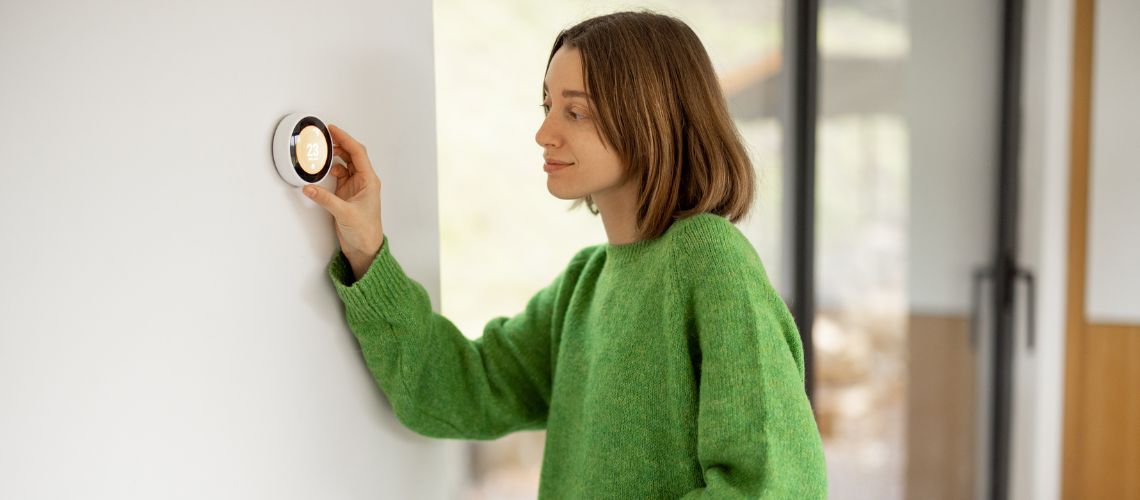Congratulations on your new home! Whether you’ve just moved in or recently completed construction on your dream house, now is the perfect time to review your energy efficiency.
Implementing energy-saving practices not only helps you save money on utility bills but also contributes to a more sustainable lifestyle.
Here are 8 easy energy-saving tips to consider trying around your new home:
Heating and Cooling
According to Perth’s energy provider, Synergy, heating and cooling can be the main contributor of household energy use.
1. Are you using Smart Temperature Controls?
This includes using a timer to pre-heat your space before you need it or pre-setting your thermostat to turn off after the room has reached temperature.
If you have a split system, then use it for zone heating and cooling. This will change the temperature in the rooms that you are using to avoid wasting energy.
Set your system to 24°C in summer and 18°C to 20°C in winter, these are still comfortable temperatures but won’t cause excessive consumption.
2. Maximise Insulation
Ensure your installation is effective and has been installed correctly. Building inspections during the build process, for new homes, would have checked for these. It may also be noted in Pre Purchase Inspection reports for maintenance. It’s worth asking your inspector at the time to check.
Also check doors and windows have been sealed effectively. A lot of a home’s heat is lost by escaping through the doors and windows even when they’re closed.
Pro tip: Open blinds and curtains in the morning to capture the sun’s heat throughout the day. Then at night close them to preserve heat as temperatures fluctuate while you are asleep.
Lighting
Consider implementing these energy saving tips for home improvement.
3. Swap Your Bulbs
If you have purchased an older home, it’s worth doing an audit of light fittings. Switch to lights that are more energy efficient like LED bulbs. They’ll save you money in the future and last longer than regular light globes.
4. Use Motion Sensors or Solar Lighting outdoors
Solar lighting is an easy way to decorate and illuminate your outdoor environment. Local stores like Bunnings have a great selection. You’re highly likely to see one of our Building Inspectors there on the weekend, say hi if you do 😊.
For wired in lighting, consider installing motion sensors and timed lights.
Additionally, you could invest in smart lighting technology for convenience and security. You can turn your lights on and off from your phone at the click of a button, or set a timer to activate your lights when you leave or return home.
Water Consumption can also use Energy
5. Check your Hot Water Thermostat
The most efficient temp is 60ºC make sure you’re not too far away from this temp to avoid excessive energy consumption. You can also use a timer to turn off water heating while you’re at work.
6. Up Your Shower Game
Get yourself some water saving shower heads and reduce your shower time. They’ll reduce the amount of water to heat and reduce your water bill at the same time.
Appliances and Electronics
7. Avoid Stand by Mode
Did you know Standby mode still consumes energy? Unplug devices and turn off lights when not in use to minimise standby power consumption. This is an easy method the whole family can try.
8. Choose your Appliances thoughtfully
Choose your appliances carefully, are they Energy Star-rated models? These meet Australia’s energy efficiency standards and consume less energy and water.
The more stars shown on the energy rating the better the energy consumption will be.
Energy saving tips for home, new or old
Our 8 energy saving tips for home improvement just might help you reduce your energy bill or at the very least contribute to a better lifestyle and energy saving practices.
Consider giving these tips a try and see what works for you. You might be surprised at how easy some of these ideas can be to implement in your home!
Want to get a building inspection to ensure your home has been built correctly and up to standard? Email our team at [email protected] or give us a call on 08 6184 5624.

